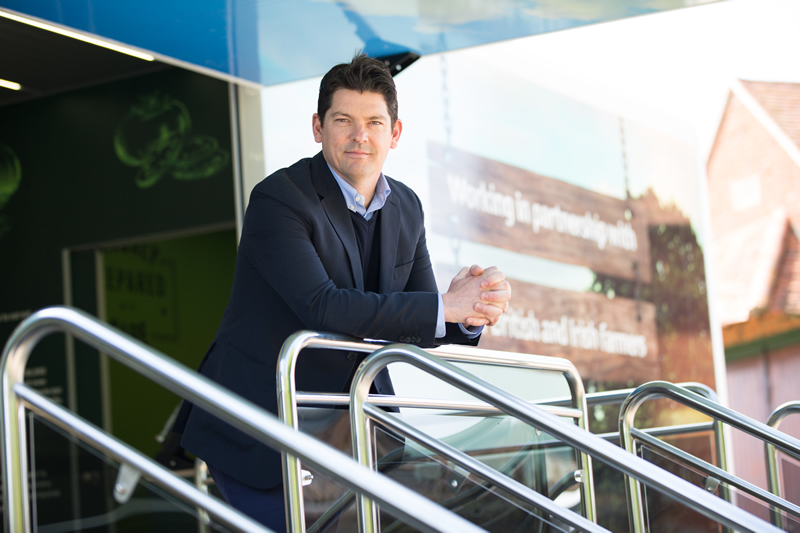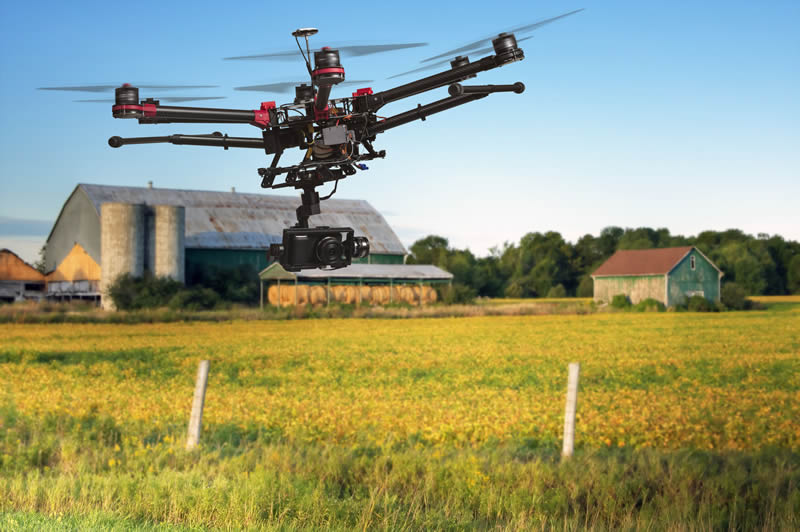
Many farmers are hoping to poach skilled workers from other industries and make use of advanced technology to tackle the challenges of post-Brexit Britain.
Concerns are growing that UK agriculture will find it increasingly difficult to retain the European Union workers on which farms have come to rely as withdrawal from the EU approaches.
And there are also fears that new trade deals with countries outside the EU will make it harder for high welfare British farmers to compete with lower welfare, low cost imports from other parts of the world.
But a new survey conducted by the National Farm Research Unit suggests that farmers are already planning to recruit workers with the right skills and make use of technological advances to make themselves more competitive.

Some 62 per cent of farmers who took part in the survey said attracting talent from outside the industry would be a key priority over the next five years and 20 per cent said they expected to increase the number of people they recruited from non-farming backgrounds.

Some 34 per cent said they planned to make use of robotics.
The research was commissioned by burger chain McDonald's UK - a big customer of British producers, spending £600 million each year in its British supply chain.
Farmers 'have got the bit between their teeth'
Connor McVeigh, the company's supply chain director, said the survey indicated that British farmers were ready to take on the challenges facing the industry over the next few years.
"I think that what's really encouraging and exciting is that they have an appetite, not to wait for it to happen, but actually to play an active part in conjunction and in partnership with companies like ourselves to put the practical solutions in place. I think that's the most encouraging thing." He said.
"Based on this survey, farmers have got the bit between their teeth and they want to manage their futures, they want to take a greater control and they see within that technology playing a very active role.
"So that gives me an awful lot of encouragement, as a representative of a company that is a big customer, spending large part of a billion pounds through our supply chain each year with British farmers and a business that is so reliant upon British farming, that we have, potentially, and I think in practice, a very prosperous and thriving prospect ahead of us."
The challenge of recruiting people into farming had been an issue for some time, even before the vote to leave the European Union, but many farmers had a plan to address the problem, he said.
"My take on it is that Brexit is somewhat incidental; it's taking place and it's an important event in the backdrop, but I didn't necessarily join the dots between what we heard through some of the key messages in this survey and what's going on with Brexit," he told Farming UK.
"The challenge that food production and farming has around recruitment is one that we have been aware of for the last couple of years.
"The Food and Drink Federation (FDF) were quoted last year as suggesting that food production and farming would need to attract 170,000 new people in. That was pre-Brexit."
Recruitment
McDonald's runs a Farm Forward programme to help its 17,500 British and Irish farmers improve skills and knowledge, animal welfare and the environment.
Part of that is its Farm Forward Barometer, which regularly seeks the views of the company's farmers on the challenges and opportunities for the industry.
"I think what's interesting for us, as part of the Farm Forward Barometer, is the appetite to recruiting technology and experience and talent in the technology and therefore how important technology will be to facing some of the challenges, maybe some of them Brexit related or otherwise that the industry is facing, as well as the opportunities that are presented in the near future," said Connor McVeigh.
The latest survey found that 86 per cent of farmers questioned said that recruiting the right skills and talent would be the top priority.
Some 62 per cent said attracting this talent from outside the industry was a key priority and 20 per cent said they expected to increase the number of people they recruited from non-farming backgrounds over the next five years.
Some 61 per cent believed that emerging technology would impact their business over the next five years, requiring a new set of skills and talent.
Asked which skills they thought the industry would need more access to in five years' time, 75 per cent of farmers said digital and technology skills, 72 per cent said business skills and 55 per cent said data analytics and coding.
Some 64 per cent of farmers said they were looking to use or already were using satellite mapping and precision farming techniques that used sensors, GPS controlled machinery and predictive analytics to ensure crops and livestock got exactly what they needed.
Some 44 per cent pointed to big data analytics, 49 per cent to remote sensing technology that took real-time measurements on crop height and weather conditions, 39 per cent highlighted drone technology and 34 per cent robotics.
Technology
"Robotics is one element of it, but technology is a broad church in farming," said Connor McVeigh.
"In the early part of next month I'm up at the Elveden Estate, who produce some of our potatoes.
"You've got Andrew Francis, who is the farm manager there, using in some instances very simple technology where he's adapting his mobile phone to create an app to help him with a dashboard of diagnostics and performance measures on his farm right the way through to, I guess you could call it robotics, where he is looking at potentially drone technology to map his farm and his fields and also to be able to map it to assess stone content in a field, therefore verifying the viability of certain parts of the farm.
"I wouldn't necessarily classify that as robotics but it's probably a more advanced form of technology than perhaps we would have expected farmers to have the appetite to use."
Andrew Francis, himself, explained how technology was helping his farming operation.
"We’re using drones and GPS guidance to improve the timing and accuracy when we apply fertiliser to our crops.
"This increases yields, reduces waste and keeps both our carbon and water footprint at optimal levels for efficient food production," he said.
"Technology skills are increasingly important as more of our monitoring, application machinery and grading equipment is digitally operated. We see the best results when we have people in place who understand technology and how to apply it."
'New challenge'
Connor McVeigh said that the use of technology and recruiting the talent to make use of such technology would help improve the efficiency of British agriculture and enable it to compete globally.
"Efficiency can be in the form of input efficiency, it can be about output efficiency in the form of yields and, again, we have heard some case study examples that have come through from our farmers on both fronts.
"Do I envisage that what we are hearing through this survey will see current forms of labour replaced in a significant way with automated technology? No. But I think what we are going to see is a need to recruit and increase the workforce that we've got in the farming industry. Also, it's going to be a different type of workforce," Mr McVeigh said.
"I think one of the interesting stats was around 20 per cent of new recruits the farmers believe they are going to be bringing into the industry are going to be from different backgrounds, different disciplines, where they can draw best practice from disciplines where technology is at a more advanced stage and replicate that in the farming industry.
"I certainly think it's good news from an employment perspective.
"Good news if we can get that talent because there are some great career opportunities that exist.
"The challenge of recruiting new people into the industry is not a new one. Recruiting different types of people and different experience and skills is, perhaps, new."
Skill shows
He said the company had taken a virtual reality display to agricultural shows and skills shows to give young people an idea about the kind of opportunities that existed in today's food and agriculture sectors.
"The skills shows are a good example of where we took feedback from our farmers.
"We converted it into the form of using the latest in virtual reality technology and we took it on a 40 foot truck around those two skills shows in London and in Birmingham to engage with sixth formers who maybe haven't made their final decision on career options.
"We took the opportunity to show them first hand through the use of the latest virtual reality technology what food production and farming genuinely involves. It's not as narrow an opportunity from a career perspective as, perhaps, some of them expected.
"It's got marketing, it's got technology, it's got data, it's got engineering opportunities - a lot of which first had we heard from those kids that they didn't anticipate that food and farming could offer them. So I think the people are out there.
"The career options are there and the breadth of choice exists there. And we, as a big customer to British farming, have got an opportunity to join the dots between those two."
'Big challenges'
The company's Progressive Young Farmer Training Programme, which has doubled in size since it began in 2012, encourages young people from all backgrounds to consider a future in agriculture.
Students on the programme develop the mix of skills to succeed in the modern farming sector by spending a year working in every part of the McDonald’s supply chain, from farm through to restaurant, and being mentored by some of the UK’s most progressive farmers and suppliers.
Connor McVeigh said, "The farming industry is currently facing some big challenges but it’s encouraging to see that, despite this, farmers are being front-footed in their investment in technology and skills to ensure the UK remains at the forefront of producing great quality produce.
“As one of the biggest customers of British farming, we want to help the industry meet these challenges head on and thrive in future."
That was why the company was continuing to support the industry through its Farm Forward programme and why, this year, it would be opening its training programme to even more young farmers to help nurture the next generation and equip them with the right skills needed by a changing industry.
